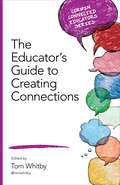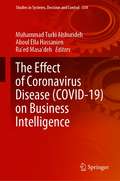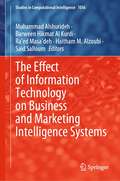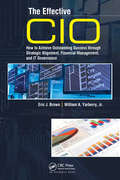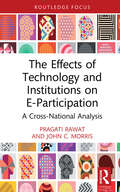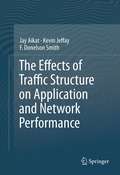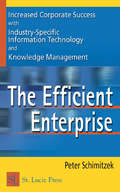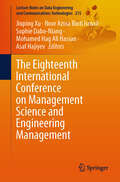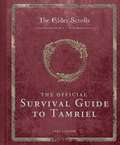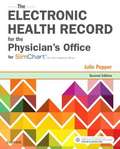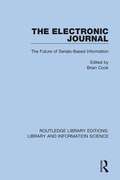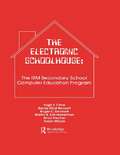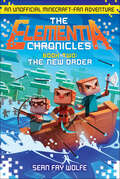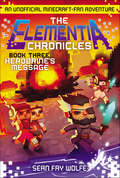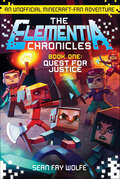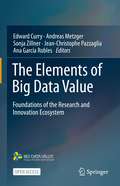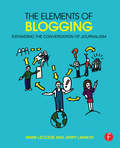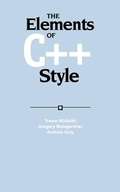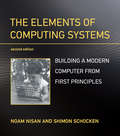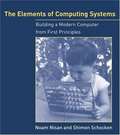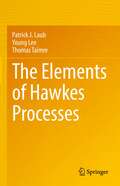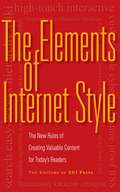- Table View
- List View
The Educator′s Guide to Creating Connections (Corwin Connected Educators Series)
by Tom WhitbyBlogging, social media, and PLN’s made easy! Collectively, we’re all smarter than we are individually. In this expert guide, EdTech leaders help you harness the power of connected collaboration using the Internet and social media. You’ll easily leverage Twitter, Facebook, LinkedIn and beyond for profound professional growth. Use real-world tips and tools to: Master and adapt to 21st Century teaching methodologies Build ongoing technology literacy for you and your students Connect and collaborate with education leaders across the globe Get connected. Get engaged. Use this inspiring, step-by-step manual to expand your personal and professional network today! The Corwin Connected Educators series is your key to unlocking the greatest resource available to all educators: other educators. Being a Connected Educator is more than a set of actions: it’s a belief in the potential of technology to fuel lifelong learning. "The successful educator is a connected educator. Quite simply, this book is a manual to stay relevant and energized in a rapidly changing profession. I highly recommend this as the definitive guidebook on building connections for the modern educator." Vicki Davis, Author "Reinventing Writing" Tom Whitby has brought together a who′s who list any educator would want to be connected with and learn from! His latest book shares great ideas on how teachers can use online strategies as one way to look and learn beyond our all-too-often isolated classrooms. Larry Ferlazzo, Award-Winning Teacher, Blogger, and Author Helping Students Motivate Themselves
The Educator′s Guide to Creating Connections (Corwin Connected Educators Series)
by Tom WhitbyBlogging, social media, and PLN’s made easy! Collectively, we’re all smarter than we are individually. In this expert guide, EdTech leaders help you harness the power of connected collaboration using the Internet and social media. You’ll easily leverage Twitter, Facebook, LinkedIn and beyond for profound professional growth. Use real-world tips and tools to: Master and adapt to 21st Century teaching methodologies Build ongoing technology literacy for you and your students Connect and collaborate with education leaders across the globe Get connected. Get engaged. Use this inspiring, step-by-step manual to expand your personal and professional network today! The Corwin Connected Educators series is your key to unlocking the greatest resource available to all educators: other educators. Being a Connected Educator is more than a set of actions: it’s a belief in the potential of technology to fuel lifelong learning. "The successful educator is a connected educator. Quite simply, this book is a manual to stay relevant and energized in a rapidly changing profession. I highly recommend this as the definitive guidebook on building connections for the modern educator." Vicki Davis, Author "Reinventing Writing" Tom Whitby has brought together a who′s who list any educator would want to be connected with and learn from! His latest book shares great ideas on how teachers can use online strategies as one way to look and learn beyond our all-too-often isolated classrooms. Larry Ferlazzo, Award-Winning Teacher, Blogger, and Author Helping Students Motivate Themselves
The Effect of Coronavirus Disease (Studies in Systems, Decision and Control #334)
by Aboul Ella Hassanien Muhammad Turki Alshurideh Ra’ed Masa’dehThis book includes recent research works on how business around the world affected by the time of COVID-19 pandemic. The impact of recent technological developments has had a tremendous impact on how we manage disasters. These developments have changed how countries and governments collect information. The COVID-19 pandemic has forced online service companies to maintain and build relationships with consumers when their world turns. Businesses are now facing tension between generating sales during a period of severe economic hardship and respect for threats to life and livelihoods that have changed consumer preferences.
The Effect of Information Technology on Business and Marketing Intelligence Systems (Studies in Computational Intelligence #1056)
by Ra’ed Masa’deh Muhammad Alshurideh Barween Hikmat Al Kurdi Haitham M. Alzoubi Said SalloumBusiness shapes have been changed these days. Change is the main dominant fact that change the way of business operations running. Topics such as innovation, entrepreneurship, leadership, blockchain, mobile business, social media, e-learning, machine learning, and artificial intelligence become essential to be considered by each institution within the technology era. This book tries to give additional views on how technologies influence business and marketing operations for insuring successful institutions survival.The world needs to develop management and intelligent business scenario plans that suite a variety of crisis appears these days. Also, business and marketing intelligence should meet government priorities in individual countries and minimise the risk of business disruptions. Business intelligence - the strategies and technology companies that use it to collect, interpret, and benefit from data - play a key role in informing company strategies, functions, and efficiency. However, being essential to the success, many companies are not taking advantage of tools that can improve their business intelligence efforts. Information technology become a core stone in business. For example, the combination of machine learning and business intelligence can have a far-reaching impact on the insights the company gets from its available data to improve productivity, quality, customer service and more. This book is important because it introduces a large number of chapters that discussed the implications of different Information technology applications in business. This book contains a set of volumes which are: 1- Social Marketing and Social Media Applications, 2- Social Marketing and Social Media Applications, 3- Business and Data Analytics, 4- Corporate governance and performance, 5- Innovation, Entrepreneurship and leadership, 6- Knowledge management, 7- Machine learning, IOT, BIG DATA, Block Chain and AI, 8- Marketing Mix, Services and Branding.
The Effective CIO: How to Achieve Outstanding Success through Strategic Alignment, Financial Management, and IT Governance
by Eric J. Brown William A. Yarberry Jr.In a business world of uncertain budgets, relentless technology changes, scarce management talent, and intense production demands, theory is good, but practice sells. The Effective CIO: How to Achieve Outstanding Success through Strategic Alignment, Financial Management, and IT Governance is all about practice, successfully delivering the nuts-and-bolts for effective governance execution. It helps to dissolve the negative image many CIOs have as remote, purely rational decision machines, while demonstrating how to improve quality and throughput in your business.This authoritative text includes governance checklists, sample IT controls, merger and acquisition recommendations, and a detailed framework for IT policies. Authored by two highly regarded IT management experts, the book provides not only a survey of existing strategies, but also includes detailed problem-solving ideas, such as how to structure optimal IT and telecom contracts with suppliers, the implications of SOP-98, and accounting for software costs. The book seamlessly brings together two perspectives - that of a working CIO who must cope with day-to-day pressures for results, and that of an IT audit consultant with a special focus on governance and internal control. Unlike many other CIO-related books that merely discuss strategies, The Effective CIO includes easy-to-follow guidelines and governance principles that can be implemented immediately.
The Effects of Cyber Supply Chain Attacks and Mitigation Strategies
by Ravi DasThe world of Cybersecurity today is becoming increasingly complex. There are many new Threat Variants that are coming out, but many of them are just tweaked versions of some of the oldest ones, such as Phishing and Social Engineering. In today’s world, Threat Variants are becoming more complex, more covert, and stealthier. Thus, it makes it almost impossible to detect them on time before the actual damage is done. One such example of this is what is known as Supply Chain Attacks. What makes this different from the other Threat Variants is that through just one point of entry, the Cyberattacker can deploy a Malicious Payload and impact thousands of victims. This is what this book is about, and it covers the following: Important Cybersecurity Concepts An introduction to Supply Chain Attacks and its impact on the Critical Infrastructure in the United States Examples of Supply Chain Attacks, most notably those of Solar Winds and Crowd Strike. Mitigation strategies that the CISO and their IT Security team can take to thwart off Supply Chain Attacks
The Effects of Technology and Institutions on E-Participation: A Cross-National Analysis (Routledge Research in Public Administration and Public Policy)
by John C. Morris Pragati RawatIn this book Pragati Rawat and John C. Morris identify and evaluate the impact of factors that can help explain the difference in e-participation, public participation using information and communication technology, in different countries. While cross-sectional studies have been covered, few have taken an in-depth look at cross-national studies. This book attempts to fill the gap using quantitative panel data to explore the influence of technology and institutions, and the impact of their complex relationships in a mediation and moderation analysis, on e-participation. The current study reviews the scholarly work in the field of “offline” and “online participation” to identify a set of antecedents that influence e-participation. A conceptual framework is developed, supported by the theories from the public policy and socio-technical premise. The authors utilize secondary data, primarily from the UN and World Economic Forum, for 143 countries from three waves of surveys to measure the dependent and explanatory variables. The panel data is statistically analyzed and findings reveal the role of technology as a mediator as well as a moderator for institutions’ impact on e-participation. The Effects of Technology and Institutions on E-Participation provides a groundbreaking country-level analysis that will appeal to academics and students of e-government and Digital Government, Public Policy, Public Administration, Public Sector Innovation, and Public Participation.
The Effects of Traffic Structure on Application and Network Performance
by Kevin Jeffay Jay Aikat F. Donelson SmithOver the past three decades, the Internet's rapid growth has spurred the development of new applications in mobile computing, digital music, online video, gaming and social networks. These applications rely heavily upon various underlying network protocols and mechanisms to enable, maintain and enhance their Internet functionality The Effects of Traffic Structure on Application and Network Performance provides the necessary tools for maximizing the network efficiency of any Internet application, and presents ground-breaking research that will influence how these applications are built in the future. The book outlines how to design and run all types of networking experiments, and establishes the best practices in synthetic traffic generation for current and future researchers and practitioners to follow. It addresses some basic concepts and methods of traffic generation, but also details extensive empirical research in testing and evaluating network protocols and applications within a laboratory setting. The Effects of Traffic Structure on Application and Network Performance is designed as a reference book for networking professionals who must design, plan, test and evaluate their networks. Advanced-level students and researchers in computer science and engineering will find this book valuable as well
The Efficient Enterprise: Increased Corporate Success with Industry-Specific Information Technology and Knowledge Management
by Peter SchimitzekIn modern business, the availability of up-to-date and secure information is critical to a company's competitive edge and marketing drive. Unfortunately, traditional business studies and classical economics are unable to provide the necessary analysis of such contemporary issues as information technology and knowledge management.The Efficie
The Eighteenth International Conference on Management Science and Engineering Management (Lecture Notes on Data Engineering and Communications Technologies #215)
by Jiuping Xu Asaf Hajiyev Sophie Dabo-Niang Mohamed Hag Ali Hassan Noor Azina Binti IsmailThe proceedings of the Eighteenth ICMSEM cover a wide range of areas including hot management issues in Engineering Science. It provides newest and frontier ideas and research achievements in the area of Management Science and Engineering Management to researchers and practitioners. The work contains both theoretical and practical studies of Management Science in the Computing Methodology, showing the advanced management concepts, computing technologies for decision making problems with large, uncertain and unstructured data. Research in this proceeding will show the new changes and challenges in the decision-making procedure as we have entered the big data era. Theoretical studies of this proceedings will present the new technologies of analysis, capture, search, sharing, storage, transfer, visualization, and privacy violations, as well as advances in integration of optimization, statistics and data mining. This proceeding also contains practical studies in the real decision-making scenarios when facing large, uncertain or unstructured data. The readers who are interested in related fields of can benefit from the proceedings for the new ideas and research direction.
The Elder Scrolls: The Official Survival Guide to Tamriel
by Tori SchaferEnter the expansive world of The Elder Scrolls Online and discover how to survive the wilds of Tamriel!Based on the award-winning Elder Scrolls Online, The Elder Scrolls Online: The Official Survival Guide to Tamriel is the ultimate guide to surviving the harsh and stunning landscape of Tamriel. This deluxe volume features incredible tips, tricks, and information to not only help you make your way through Tamriel, but provide solid advice in the real world as well. · Everything you need to know. Tamriel is a harsh world, with many, many dangers. Find the tips and tricks you need to survive the perilous encounters there...and in the real world. · Don&’t cut your adventuring life short! Learn how to dress a wound, how to survive encounters with wildlife, and even how best to pack for the adventuring life. · A stunning addition to your collection. Featuring exclusive artwork and packed full of lore, this premium hardcover book is a must have for every Elder Scrolls fan.
The Electronic Health Record For The Physician's Office: For Simchart For The Medical Office
by Julie PepperThe Electronic Health Record for the Physician's Office, 2nd Edition uses online simulations to walk you through each EHR task. Clear, step-by-step guidelines simplify the exercises in each simulation, so you learn all the EHR skills required of a medical office professional. This edition adds in-depth review and preparation for the Certified Electronic Health Records Specialist (CEHRS) examination. Written by Medical Assisting educator Julie Pepper, this how-to manual helps you master the administrative, clinical, and billing/coding skills you need to gain certification and succeed on the job. Access to SimChart for the Medical Office sold separately.
The Electronic Journal: The Future of Serials-Based Information (Routledge Library Editions: Library and Information Science #31)
by Brian CookThis book, first published in 1992, outlines the issues, indicates major trends, and sets challenges for libraries and publishers concerning new technologies and serials. Libraries in Australia and New Zealand have struggled for years with the problems of distance and cost in a print-oriented publishing industry dominated by countries half way across the globe. This book provides practical advice on the need for Australasian libraries to become actively involved in the possibilities of this new technology in order to maximize the benefits for themselves and their clients. Throughout the book, the contributors emphasize the need for improved communication between authors, publishers, information technology specialists, libraries, and users, and propose a standardization of formats and delivery systems to aid easy cooperation between such diverse groups. The chapters stress the need for user-friendly access to information along with education programs that are tailor-made to meet different access requirements.
The Electronic Schoolhouse: The Ibm Secondary School Computer Education Program
by Hugh F. Cline, Randy Elliot Bennett, Roger C. Kershaw, Martin B. Schneiderman, Brian Stecher and Susan WilsonPublished in the year 1985, The Electronic Schoolhouse is a valuable contribution to the field of Education.
The Electronic Word: Democracy, Technology, and the Arts
by Richard A. LanhamProfound changes in expressive medium always ask a fundamental ques¬tion: What does this medium do to us and for us? We ask this in a deep way only when the new medium reveals what profound effects the old one has had on us. That question is now being asked by electronic text about books.
The Elementia Chronicles: An Unofficial Minecraft-fan Adventure (Elementia Chronicles #2)
by Sean Fay WolfeAn unofficial Minecraft-fan adventure series inspired by the bestselling game!Fans of the bestselling video game Minecraft, middle grade readers, and action-adventure story enthusiasts of all ages experience an exciting journey that will take them far beyond the world they know.President Stan has led his people through an epic battle and brought peace to the Republic of Elementia. But dissent is rippling through the countryside. King Kev's loyal followers are still at large, and a new organization, the Noctem Alliance, is poised to strike terror throughout the land. With new threats on the horizon and citizens of the Republic dividing between two loyalties, Stan must decide the best way forward for his people and stop the Noctem Alliance before it destroys them all.Written when he was seventeen years old, Sean Fay Wolfe's The Elementia Chronicles Book Two: The New Order is the second novel in The Elementia Chronicles trilogy.Disclaimer: This book is not authorized, sponsored, endorsed, or licensed by Mojang AB, Microsoft Corp., or any other person or entity owning or controlling any rights to the Minecraft name, trademarks, or copyrights. Minecraft is a registered trademark of Mojang Synergies AB.
The Elementia Chronicles: Herobrine's Message (Elementia Chronicles #3)
by Sean Fay WolfeAn unofficial Minecraft-fan adventure series inspired by the bestselling game!Fans of the bestselling video game Minecraft, middle grade readers, and action-adventure story enthusiasts of all ages will experience an exciting journey that will take them far beyond the world they know.The Republic of Elementia is in ruins after the Noctem Alliance wages war on Element City. President Stan and his council are scattered across the server, trying to find their way back to one another to continue their fight for freedom. And a mysterious figure has joined their world—one with the power to save or destroy them all. In the stunning conclusion to the Elementia Chronicles trilogy, Stan, Kat, Charlie, and their friends make a last stand for the world they love in an epic battle of good vs. evil.Written when he was seventeen years old, Sean Fay Wolfe's The Elementia Chronicles Book III: Herobrine's Message is the third and final novel in The Elementia Chronicles trilogy.Disclaimer: This book is not authorized, sponsored, endorsed, or licensed by Mojang AB, Microsoft Corp., or any other person or entity owning or controlling any rights to the Minecraft name, trademarks, or copyrights. Minecraft is a registered trademark of Mojang Synergies AB.
The Elementia Chronicles: Quest for Justice (Elementia Chronicles #1)
by Sean Fay WolfeIntroducing an unofficial Minecraft-fan adventure series inspired by the bestselling game!Fans of the bestselling video game Minecraft, middle grade readers, and action-adventure story enthusiasts of all ages are about to embark on an exciting journey that will take them far beyond the world they know.Dark forces are at work on the Elementia server, and when new players Stan, Kat, and Charlie arrive on the scene, they quickly find themselves in peril. Targeted by more experienced players, the noobs must band together against the king, battle the natural forces of the game, and unravel the mysteries of Elementia in the name of justice.Written when he was sixteen, Sean Fay Wolfe's Quest for Justice is the debut novel by an unstoppable young storyteller and the first book in The Elementia Chronicles trilogy.Disclaimer: This book is not authorized, sponsored, endorsed or licensed by Mojang AB, Microsoft Corp. or any other person or entity owning or controlling any rights to the Minecraft name, trademarks or copyrights. Minecraft is a registered trademark of Mojang Synergies AB.
The Elements of Big Data Value: Foundations of the Research and Innovation Ecosystem
by Edward Curry Andreas Metzger Sonja Zillner Jean-Christophe Pazzaglia Ana García RoblesThis open access book presents the foundations of the Big Data research and innovation ecosystem and the associated enablers that facilitate delivering value from data for business and society. It provides insights into the key elements for research and innovation, technical architectures, business models, skills, and best practices to support the creation of data-driven solutions and organizations. The book is a compilation of selected high-quality chapters covering best practices, technologies, experiences, and practical recommendations on research and innovation for big data. The contributions are grouped into four parts: · Part I: Ecosystem Elements of Big Data Value focuses on establishing the big data value ecosystem using a holistic approach to make it attractive and valuable to all stakeholders. · Part II: Research and Innovation Elements of Big Data Value details the key technical and capability challenges to be addressed for delivering big data value. · Part III: Business, Policy, and Societal Elements of Big Data Value investigates the need to make more efficient use of big data and understanding that data is an asset that has significant potential for the economy and society. · Part IV: Emerging Elements of Big Data Value explores the critical elements to maximizing the future potential of big data value. Overall, readers are provided with insights which can support them in creating data-driven solutions, organizations, and productive data ecosystems. The material represents the results of a collective effort undertaken by the European data community as part of the Big Data Value Public-Private Partnership (PPP) between the European Commission and the Big Data Value Association (BDVA) to boost data-driven digital transformation.
The Elements of Blogging: Expanding the Conversation of Journalism
by Mark Leccese Jerry LansonBecoming a blogger takes practice, hard work, and, ultimately, a passion for the craft. Whether you plan to blog on politics or parenting, The Elements of Blogging is designed to give you the skills and strategies to get started, to sustain your work, and to seek out a robust audience. This book is loaded with practical advice on important topics such as determining a niche, finding the best stories, and blogging effectively and ethically. It features examples from both amateur and professional bloggers that show the techniques for building an argument, finding a voice, crafting a headline, and establishing a brand. Key features: Real-world applicability. This book includes thumbnail profiles of bloggers and their sites, which illuminate key skills you will need to become an effective blogger Interactivity. Each chapter features discussion points and exercises intended to get you to think about, reflect on, and apply the contents of each chapter Creativity. While this book dives into software and plug-ins for bloggers, its main goal is to cover how to write blogs on a myriad of topics: news, opinion pieces, travel, politics, art, and more. Visit the companion website: http://www.theelementsofblogging.com/
The Elements of C++ Style
by Trevor Misfeldt Gregory Bumgardner Andrew GrayThe Elements of C++ Style is for all C++ practitioners, especially those working in teams where consistency is critical. This text furnishes a set of rules for writing in C++. The authors offer a collection of standards and guidelines for creating solid C++ code that will be easy to understand, enhance, and maintain.
The Elements of Computing Systems, second edition: Building a Modern Computer from First Principles
by Noam Nisan Shimon SchockenA new and extensively revised edition of a popular textbook used in universities, coding boot camps, hacker clubs, and online courses.The best way to understand how computers work is to build one from scratch, and this textbook leads learners through twelve chapters and projects that gradually build the hardware platform and software hierarchy for a simple but powerful computer system. In the process, learners gain hands-on knowledge of hardware, architecture, operating systems, programming languages, compilers, data structures and algorithms, and software engineering. Using this constructive approach, the book introduces readers to a significant body of computer science knowledge and synthesizes key theoretical and applied techniques into one constructive framework.The outcome is known known as Nand to Tetris: a journey that starts with the most elementary logic gate, called Nand, and ends, twelve projects later, with a general-purpose computer system capable of running Tetris and any other program that comes to your mind.The first edition of this popular textbook inspired Nand to Tetris classes in many universities, coding boot camps, hacker clubs, and online course platforms. This second edition has been extensively revised. It has been restructured into two distinct parts—part I, Hardware, and part II, Software—with six projects in each part. All chapters and projects have been rewritten, with an emphasis on separating abstraction from implementation, and many new sections, figures, and examples have been added. Substantial new appendixes offer focused presentation on technical and theoretical topics.
The Elements of Computing Systems: Building a Modern Computer from First Principles
by Noam Nisan Shimon SchockenIn the early days of computer science, the interactions of hardware, software, compilers, and operating system were simple enough to allow students to see an overall picture of how computers worked. With the increasing complexity of computer technology and the resulting specialization of knowledge, such clarity is often lost. Unlike other texts that cover only one aspect of the field, The Elements of Computing Systems gives students an integrated and rigorous picture of applied computer science, as its comes to play in the construction of a simple yet powerful computer system. Indeed, the best way to understand how computers work is to build one from scratch, and this textbook leads students through twelve chapters and projects that gradually build a basic hardware platform and a modern software hierarchy from the ground up. In the process, the students gain hands-on knowledge of hardware architecture, operating systems, programming languages, compilers, data structures, algorithms, and software engineering. Using this constructive approach, the book exposes a significant body of computer science knowledge and demonstrates how theoretical and applied techniques taught in other courses fit into the overall picture. Designed to support one- or two-semester courses, the book is based on an abstraction-implementation paradigm; each chapter presents a key hardware or software abstraction, a proposed implementation that makes it concrete, and an actual project. The emerging computer system can be built by following the chapters, although this is only one option, since the projects are self-contained and can be done or skipped in any order. All the computer science knowledge necessary for completing the projects is embedded in the book, the only pre-requisite being a programming experience. The book's web site provides all tools and materials necessary to build all the hardware and software systems described in the text, including two hundred test programs for the twelve projects. The projects and systems can be modified to meet various teaching needs, and all the supplied software is open-source.
The Elements of Hawkes Processes
by Thomas Taimre Patrick J. Laub Young LeeHawkes processes are studied and used in a wide range of disciplines: mathematics, social sciences, and earthquake modelling, to name a few. This book presents a selective coverage of the core and recent topics in the broad field of Hawkes processes. It consists of three parts. Parts I and II summarise and provide an overview of core theory (including key simulation methods) and inference methods, complemented by a selection of recent research developments and applications. Part III is devoted to case studies in seismology and finance that connect the core theory and inference methods to practical scenarios. This book is designed primarily for applied probabilists, statisticians, and machine learners. However, the mathematical prerequisites have been kept to a minimum so that the content will also be of interest to undergraduates in advanced mathematics and statistics, as well as machine learning practitioners. Knowledge of matrix theory with basics of probability theory, including Poisson processes, is considered a prerequisite. Colour-blind-friendly illustrations are included.
The Elements of Internet Style: The New Rules of Creating Valuable Content for Today's Readers
by Eei PressEats, Shoots & Leaves for the Internet! Learn the rules of today's tech-driven publishing landscape! The Elements of Internet Style is the first guide to embrace the new reality of creating content in the electronic age. It is packed with the tools to reach and engage today's too-busy, too-skeptical, too-distractible readers. Read this book, and understand the trend toward greater and greater informality. Then discover the effects of this trend on punctuation and capitalization, new words, usage, the methods for making language decisions when there is no clear authority, as well as the mounting need for built-in accessibility, comprehension aids, and navigation tools in every written document and on every web page. Chapters cover new technologies, new audience expectations, formatting,readability and flow, and much more. The Elements of Internet Style is a must-have for everyone who cares about delivering information to readers online, in print, and everywhere else. * The first guide to Internet style and usage * Clear directions for reaching and engaging today's multitasking readers * A must-have for editors, writers, bloggers, anyone who creates content in any medium.
